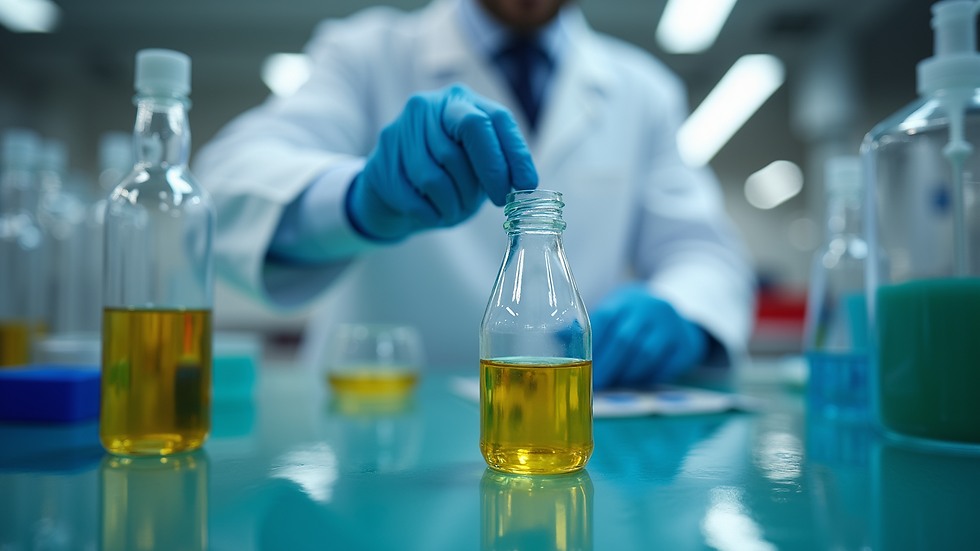Transform Industrial Wastewater with Advanced Solutions
- palwinder kaur
- Sep 3, 2025
- 3 min read
Industrial growth has brought many benefits, but it has also increased the challenge of managing wastewater generated by factories and plants. Treating this wastewater effectively is crucial to protect the environment and comply with regulations. Advanced solutions in industrial wastewater treatment are transforming how industries handle their waste, making processes more efficient, sustainable, and cost-effective.
Understanding Industrial Wastewater Treatment Technologies
Industrial wastewater treatment involves removing contaminants from water used in manufacturing and other industrial processes. The goal is to reduce pollutants to safe levels before releasing the water back into the environment or reusing it within the facility.
There are several technologies used in industrial wastewater treatment, each suited to different types of waste and industries:
Physical Treatment: This includes screening, sedimentation, and filtration to remove large particles and solids.
Chemical Treatment: Chemicals are added to neutralize harmful substances or precipitate contaminants for easier removal.
Biological Treatment: Microorganisms break down organic pollutants in processes like activated sludge or biofilm reactors.
Advanced Treatment: Techniques such as membrane filtration, reverse osmosis, and advanced oxidation provide high levels of purification.
Choosing the right combination depends on the wastewater's composition and the desired quality of the treated water.

Benefits of Implementing Modern Industrial Wastewater Treatment
Adopting advanced treatment solutions offers multiple advantages:
Environmental Protection: Proper treatment prevents harmful chemicals and pollutants from entering natural water bodies.
Regulatory Compliance: Meeting local and international discharge standards avoids fines and legal issues.
Resource Recovery: Treated water can be reused in processes, reducing freshwater consumption and lowering costs.
Energy Efficiency: New technologies often consume less energy, reducing the carbon footprint of industrial operations.
Improved Public Image: Demonstrating environmental responsibility enhances brand reputation and stakeholder trust.
For example, a textile factory using membrane bioreactors can recycle up to 80% of its wastewater, significantly cutting water usage and operational costs.
What are the components of industrial wastewater?
Industrial wastewater contains a complex mix of substances depending on the industry. Common components include:
Organic Matter: Oils, greases, solvents, and food residues.
Inorganic Chemicals: Heavy metals like lead, mercury, and cadmium.
Suspended Solids: Particles that do not dissolve in water.
Nutrients: Nitrogen and phosphorus compounds that can cause eutrophication.
Pathogens: Bacteria and viruses from biological waste.
Toxic Substances: Pesticides, dyes, and other hazardous chemicals.
Understanding these components is essential for designing effective treatment systems. For instance, heavy metals require chemical precipitation or ion exchange, while organic matter is best handled by biological processes.

Practical Steps to Upgrade Your Industrial Wastewater Treatment System
Upgrading an existing wastewater treatment system or installing a new one can seem daunting. Here are actionable recommendations to guide the process:
Conduct a Comprehensive Wastewater Audit
Analyze the volume and composition of wastewater generated. This data helps in selecting appropriate treatment technologies.
Set Clear Treatment Goals
Define the quality standards for treated water based on regulatory requirements and reuse plans.
Choose Suitable Technologies
Combine physical, chemical, and biological methods tailored to your wastewater profile.
Implement Automation and Monitoring
Use sensors and control systems to optimize treatment efficiency and detect issues early.
Train Staff and Maintain Equipment
Skilled operators and regular maintenance ensure consistent performance and longevity of the system.
Explore Resource Recovery Options
Consider recovering valuable materials like metals or biogas from sludge.
By following these steps, industries can achieve sustainable wastewater management that supports both environmental and business goals.
Future Trends in Industrial Wastewater Treatment
The field of industrial wastewater treatment is evolving rapidly with innovations that promise even greater efficiency and sustainability:
Smart Treatment Systems: Integration of IoT and AI for real-time monitoring and adaptive control.
Green Chemistry: Use of eco-friendly chemicals and processes to minimize secondary pollution.
Circular Economy Approaches: Designing systems that recover water, energy, and materials to close resource loops.
Decentralized Treatment: Smaller, modular units that can be deployed on-site for specific waste streams.
Advanced Membrane Technologies: New materials offering higher permeability and fouling resistance.
These trends will help industries meet stricter environmental standards while reducing costs and resource consumption.

Taking the Next Step in Industrial Wastewater Management
Transforming your approach to wastewater treatment is not just about compliance; it is an opportunity to innovate and lead in sustainability. By leveraging advanced solutions, industries can turn wastewater challenges into competitive advantages.
For more detailed information and tailored solutions, consider consulting experts in industrial wastewater treatment. They can provide insights and technologies that fit your specific needs and help you achieve long-term success.
Investing in modern wastewater treatment is investing in a cleaner, safer future for your business and the environment.



Comments